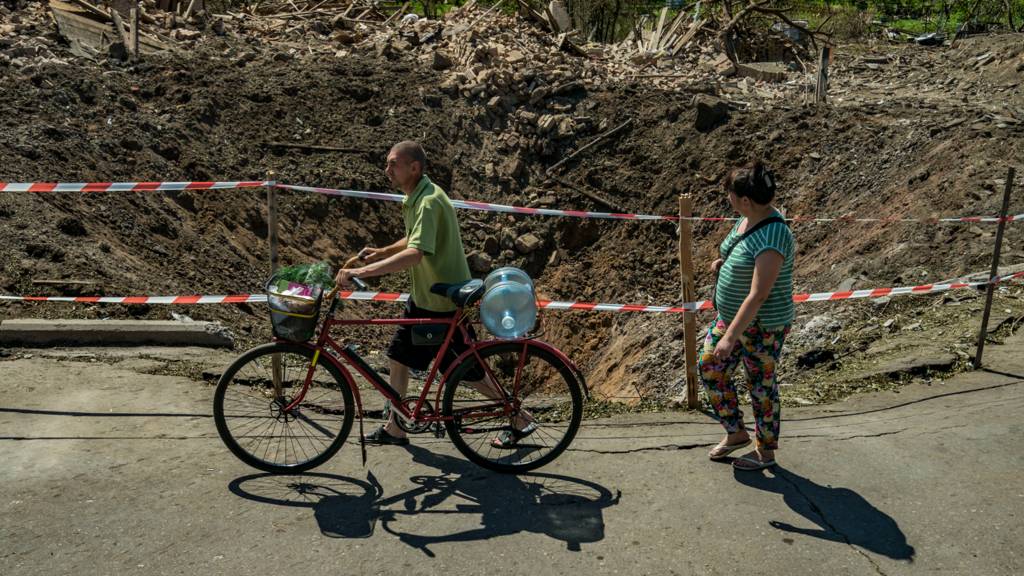
As it happened: Ukraine conflict settling into 'WW1-style trench warfare'
Updates from BBC correspondents: Joe Inwood, James Waterhouse and Abdujalil Abdurasulov in Kyiv, Wyre Davies in Dnipro, Joel Gunter in Kharkiv, Orla Guerin in Donbas, and Steve Rosenberg in Moscow
Related Video and Audio
RTL
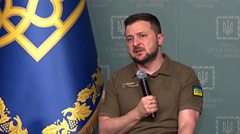
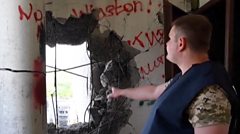
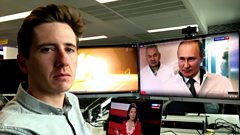


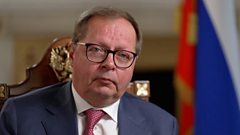
Live Reporting
Edited by Chris Giles
All times stated are UK
Get involved

ReutersCopyright: Reuters -
The conflict in Ukraine is settling into World War One-style trench warfare, according to military analyst Justin Crump
-
He told the BBC, Russia was now "lucky" to be capturing as much as a field in 24 hours because whichever side is defending appears to have an advantage in any given battle
-
Ukrainian forces are finding it hard to stave off Russian attacks in the centre of Severodonetsk but Russia has still not taken control of the city, Luhansk regional governor Serhiy Haidai said
-
Russia is aiming to capture the city with more troops, but Severodonetsk's armed forces have "strengthened their positions and are holding the line," according to the city's mayor, Oleksandr Stryuk
-
The head of the International Atomic Energy Agency - the UN's nuclear watchdog - has dismissed as absurd allegations by Ukraine's nuclear operator that he had lied about being invited to visit the Russian-occupied nuclear plant at Zaporizhzhia
-
Russia has jailed 600 journalists and activists in the Kherson region who are being held hostage in specially equipped basements, according to the Ukrainian president's envoy for Crimea, Tamila Tasheva

ReutersCopyright: Reuters 
Reuters / EnergoatomCopyright: Reuters / Energoatom The Zaporizhzhia nuclear power plant, after attacks in MarchImage caption: The Zaporizhzhia nuclear power plant, after attacks in March 
.Copyright: . 
BBCCopyright: BBC 
.Copyright: . 
BBCCopyright: BBC 
Getty ImagesCopyright: Getty Images -
The fighting in Ukraine has taken on a rhythm reminiscent of trench warfare during World War I, according to a military analyst
-
Justin Crump told the BBC Russia was now "lucky" to be capturing as much as a field in 24 hours because whichever side is defending appears to have an advantage in any given battle
-
Russia has said it now controls 97% of the Luhansk region in eastern Ukraine, according to defence minister Sergei Shoigu
-
He said Russian forces have seized residential areas in the key eastern city of Severodonetsk, where heavy fighting continues
-
The bodies of 160 Ukrainian fighters killed defending the southern port city of Mariupol from Russian forces at the Azovstal steel plant have been handed over to Kyiv as part of a prisoner exchange with Russia, families of the soldiers say
-
Ukraine's national nuclear operator has accused the head of the International Atomic Energy Agency of lying about being invited to visit the Russian-occupied nuclear plant at Zaporizhzhia

PA MediaCopyright: PA Media British troops in World War One going up the line to their trenchesImage caption: British troops in World War One going up the line to their trenches Video caption: Ukraine war: Inside Kyiv's trench defencesUkraine war: Inside Kyiv's trench defences 

@Zvezdanews telegram channelCopyright: @Zvezdanews telegram channel 
Channel One/ReutersCopyright: Channel One/Reuters Analysis

Getty ImagesCopyright: Getty Images Soldiers walk in trenches to take cover for Russian artillery strikes at an undisclosed defence position on the outskirts of the separatist region of DonetskImage caption: Soldiers walk in trenches to take cover for Russian artillery strikes at an undisclosed defence position on the outskirts of the separatist region of Donetsk 
ReutersCopyright: Reuters Ukrainian troops walk along a trench at a position on the frontline near Bakhmut in Ukraine's Donbas regionImage caption: Ukrainian troops walk along a trench at a position on the frontline near Bakhmut in Ukraine's Donbas region 
Getty ImagesCopyright: Getty Images Ukraine's army appears to have an advantage in any given battle at the moment because they are generally defending rather than attacking, according to military analyst Justin CrumpImage caption: Ukraine's army appears to have an advantage in any given battle at the moment because they are generally defending rather than attacking, according to military analyst Justin Crump 
ReutersCopyright: Reuters A Ukrainian servicewoman looks out of a trench at a position near a frontline in the Donetsk regionImage caption: A Ukrainian servicewoman looks out of a trench at a position near a frontline in the Donetsk region 
ReutersCopyright: Reuters Parts of Ukraine have been taken back to the trench-filled warfare of decades agoImage caption: Parts of Ukraine have been taken back to the trench-filled warfare of decades ago 
Reuters / Ukrainian Defence MinistryCopyright: Reuters / Ukrainian Defence Ministry 
.Copyright: . Analysis 
Getty ImagesCopyright: Getty Images 
ReutersCopyright: Reuters Russia could look to make 'micro-scale' gains in Kharkiv, says an expertImage caption: Russia could look to make 'micro-scale' gains in Kharkiv, says an expert 
.Copyright: . 
ReutersCopyright: Reuters The Azovstal steelwork was for weeks under relentless Russian shellingImage caption: The Azovstal steelwork was for weeks under relentless Russian shelling
Latest PostPost update
Today’s live page was edited by Jeremy Gahagan, Alex Therrien, Marie Jackson and Chris Giles.
The writers were James Fitzgerald, Sam Hancock, Alexandra Fouché, Emily McGarvey and Hamzah Abbas.
Join us tomorrow.
What happened in Ukraine today?
We're pausing our live coverage soon, but here's a look at the main developments in Ukraine today:
No justification for Russia's brutal disregard of law - Merkel
There is no justification for Russia's brutal disregard of international law in Ukraine, the former German-Chancellor Angela Merkel has said in her first interview since leaving office last year.
Merkel said that "if we start going through the centuries and say which piece of territory belongs to whom, then we'll only have war - that's not possible at all".
Ukrainian President Volodymyr Zelensky previously criticised Merkel and former French President Nicolas Sarkozy for their move to block Ukraine's admission to Nato in 2008, suggesting that it had been a clear "miscalculation" that emboldened Russia.
Asked about rejecting Ukraine's Nato membership back then, Merkel said that if she hadn't have vetoed the move, "Putin would do something that would not be good for Ukraine".
World Bank slashes 2022 global growth forecast
The World Bank has downgraded its estimate for global economic growth to 2.9% because of the conflict in Ukraine, which along with other factors, has caused a severe downturn.
"Global growth is expected to slump from 5.7% in 2021 to 2.9% in 2022 - significantly lower than 4.1% that was anticipated in January," it said in its Global Economic Prospects report.
"The world economy is expected to experience its sharpest deceleration following an initial recovery from global recession in more than 80 years," it added.
Global economic growth had recovered to 5.7% last year following the downturn caused by the Covid-19 pandemic.
"The war in Ukraine, lockdowns in China, supply-chain disruptions, and the risk of stagflation are hammering growth. For many countries, recession will be hard to avoid," said the bank's president, David Malpass.
Row deepens over UN watchdog visit to Ukraine nuclear plant
The head of the International Atomic Energy Agency - the UN's nuclear watchdog - has dismissed as absurd allegations by Ukraine's nuclear operator that he had lied about being invited to visit a Russian-occupied nuclear power plant there.
Rafael Grossi has been trying to visit the Zaporizhzhia nuclear plant - Europe's largest - which Russian forces took control of in early March.
But Ukraine's nuclear operator has said a visit by the watchdog would legitimise Russia's occupation of the plant.
Speaking to the BBC's Newshour, Grossi said there was a contractual obligation to allow safety inspections by his organisation.
"The government have requested us to do this. There have been statements, I believe even today, implying that... I am lying when I say this."
He added that it was not "an invitation that can or can't be extended", but "an obligation" as there is a lot of nuclear material at the plant which has not been inspected, leading to an "abnormal" and "unsustainable" situation.
There is no suggestion that the Ukrainian government has accused Grossi of lying, though the country's nuclear operator, Energoatom, says that Ukraine has not invited him to visit.
Ukraine struggling to fight off Russians in Severodonetsk
As we've been reporting, heavy fighting is continuing in the eastern Ukrainian city of Severodonetsk, which Russian forces have been trying to capture for weeks.
Now, officials say Ukrainian forces are finding it hard to stave off Russian attacks in the centre of Severodonetsk but Russia has still not taken control of the city, according to Luhansk regional governor Serhiy Haidai.
Earlier, the city's mayor, Oleksandr Stryuk warned that Russia was aiming to capture the city with more troops, and said that Severdonetsk's armed forces have "strengthened their positions and are holding the line".
Russian troops were constantly shelling its twin city Lysychansk, and Moscow's forces were deliberately targeting areas where civilians were hiding, Haidai said on the Telegram messaging app.
He reiterated a call for long-range artillery to be sent to Ukraine to enable its troops to repel the Russians in the region.
Konstantinovka deputy warns of problems with food and water
Anna Melnichuk, the deputy leader of Konstantinovka city council, has been outlining the problems faced in her city and neighbouring areas.
She told the BBC that while the city, north of Donetsk, is being protected by the Ukrainian army, conditions are difficult.
"We have some problems with gas, and water as well."
She added that the government and local council were in touch with organisations which were providing food, but deliveries by car were difficult due to problems with petrol.
When asked about the conditions in Severodonetsk, where fighting continues, Melnichuk said: "Yes, the situation is truly difficult, but not just because of war actions, but because of problems with water, with food, with electricity."
Russia has jailed 600 journalists and activists, says Ukraine
About 300 Ukrainian civilians, mostly journalists and public activists, are being kept in improvised prisons in Kherson, and 300 more in other occupied settlements in the Kherson region, according to the Ukrainian president's envoy for Crimea, Tamila Tasheva.
Tasheva said there are about 600 people in the region who are "actually hostages and are being held in specially equipped basements, actually jails," Interfax news agency reported.
"They are kept in inhumane conditions and tortured. Witnesses report cries that could be heard from the places were our citizens are subjected to such illegal actions," she told a news briefing.
She said some civilians are being moved from the Kherson region to Crimea and being kept as "civilian hostages and prisoners of war".
"Some people who left Mariupol were detained during filtration on the administrative border with Crimea and were taken to the Simferopol remand centre," she said.
What's the latest?
If you are just joining us, or looking for a recap, here's a round-up of the latest events in Ukraine:
What is trench warfare?
The conflict in parts of Ukraine has been described as reminiscent of the trench warfare used in World War I - but what is meant by the term?
Trenches are ditches dug into the ground that offer shelter and protection against enemy fire and means both sides sacrifice mobility in order to gain protection.
During World War I, trenches were developed from simple ditches into more complex systems, with a front line, known as the fire trench, the second line, known as the support trench, and a third line, known as the reserve trench.
These trenches were connected by communication trenches, which allowed men to run between lines, without ever having to go over open ground.
The BBC has previously been granted access to trenches being used by the Ukrainian army.
The soldiers working and living in them told the BBC that they are sleeping and eating in them, while building new ones every day.
Video content
British men captured in Ukraine appear in court video
Joe Inwood
Reporting from Kyiv
There had been much speculation about what had happened to Aiden Aslin and Shaun Pinner, two British men captured fighting in the Ukrainian port city of Mariupol.
Footage of Aslin shortly after his capture - his face bloodied and bruised, being interviewed by a Russian propaganda channel - led many to fear for his wellbeing.
Now we know both men are alive and are being held in the occupied Donestsk People’s Republic, after a video appeared of them standing in what appears to be a court.
Standing alongside a third man, Moroccan national Saaudun Brahim, the pair spoke only to confirm they knew the charges against them and were happy for their case to proceed without the evidence of witnesses.
Both were able to stand unaided and seemed aware of their surroundings.
According to the Interfax news agency, the leader of the self-proclaimed DNR, Denis Pushilin, has said they will be charged in the “Supreme Court” of the region, which is not recognised internationally.
The British pair are facing several “charges”, including violent seizure of power, acting as mercenaries and undergoing training to carry out terrorist activities.
It is feared the court, which is not internationally recognised, could give them the death penalty if it finds them guilty.
Russia votes to leave European Court of Human Rights
Russia's parliament has passed two bills ending the European Court of Human Rights’ jurisdiction in Russia, after it announced it would exit the court in March amid the conflict in Ukraine.
The ECHR aims to apply and protect the civil and political rights of the continent's citizens, and this previously provided a way to pursue legal and human rights cases against Russia that had either been rejected or ignored by Russian courts.
One of the bills removes Russia from the court's jurisdiction and the second bill sets 15 March as the cut-off point, meaning rulings against Russia made after that date are not to be implemented, the RIA Novosti news agency reports.
The Committee of Ministers of the Council of Europe expelled Russia from the organisation on 15 March, which the ECHR is part of, in response to Russia‘s invasion of Ukraine.
Russia has said that it independently decided to leave the Council of Europe, with former President Dmitry Medvedev saying that Russia‘s exit from the organisation represented an opportunity to restore the death penalty, which the Council of European’s rules prohibit.
Russian TV protest journalist to switch to Ukrainian surname
A Russian journalist who was fined and released after she protested against the war in Ukraine on a live TV news programme earlier this year says she feels Ukrainian and will change her surname as a sign of support.
Marina Ovsyannikova - who says her father is Ukrainian - announced the move in a post on Facebook.
"I'm not a 'good Russian', I'm Ukrainian. As a sign of support of Ukraine, I intend to change the surname of Ovsyannikov to the native Tkachuk."
Formerly an editor at Russian state-controlled Channel One, she was shortly detained in March in Russia after she ran on to the set of the channel holding a sign saying "no war".
She has since emigrated to Germany.
Zelensky pays tribute to 'true friend' Johnson after confidence vote
James Waterhouse
Reporting from Kyiv
“Very happy” were two of the words President Volodymyr Zelensky used in reaction to UK Prime Minister Boris Johnson surviving his vote of confidence, describing him as a “true friend of Ukraine”.
It’s a sentiment echoed by many on the cobbled streets of central Kyiv, mainly because the UK government is one of the biggest supporters of the country in this war, outside the European Union and United States.
Of course, people’s views of the British prime minister aren’t shaped by domestic issues.
Even before this invasion, though, Ukrainians cared deeply about the level of military aid being supplied by western allies as Russia continued to gather troops on the border.
They are continuing to defend, but Russia has already taken a fifth of Ukrainian territory.
In pictures: Trench warfare on the frontline
As we reported earlier, military analyst Justin Crump has said conflict in parts of Ukraine is now reminiscent of the trench warfare seen in World War One.
Here's a selection of images capturing life for Ukrainian troops in trench positions on the frontline:
Severodonetsk armed forces 'holding the line' - Mayor
Earlier, we reported on the fighting in Severodonetsk and Lysychansk.
President Zelensky called them "dead cities" and now Severodonetsk's Mayor, Oleksandr Stryuk, has been speaking to Ukrainian TV about the current situation.He warned that Russia is aiming to capture the city with more troops, and said that Severdonetsk's armed forces have "strengthened their positions and are holding the line".
An update from the Ukrainian armed forces earlier today also suggested that there were further Russian troops in the area.
It has not yet been possible for the BBC to verify exact details of the fighting.
Row continues over UN visit to Ukraine nuclear plant
Danny Aeberhard
Europe Regional Editor, BBC World Service
As we've been reporting, Ukraine's national nuclear operator has accused the head of the UN nuclear watchdog, IAEA, of lying about being invited by Ukraine to visit the Russian-occupied nuclear plant at Zaporizhzhia.
The IAEA's director general, Rafael Grossi, insisted on Monday that such a visit would take place, ideally sooner rather than later, citing fears over nuclear security at the plant
Ukraine's nuclear operator, Energoatom, did not mince its words.
In a statement, it said it saw efforts by Grossi to visit the Zaporizhzhia plant as an attempt to legitimise Russia's occupation of the facility.
It said Ukraine had not invited him to visit, and had refused permission previously.
Energoatom also blamed Russia for blocking the transfer of crucial data from the plant to the IAEA.
Grossi - in an impassioned address on Monday - stressed a visit was vital, saying the Zaporizhzhia plant was disconnected from safety systems.
Russian forces took over the plant - Europe's largest - at the start of the conflict.
Russia claims to control 97% of Luhansk region
Russian forces now control almost all of Ukraine's easternmost region, the Russian defence minister says.
97% of Luhansk Oblast has been "liberated", Sergei Shoigu told a meeting of the defence ministry, broadcast on state TV.
Shoigu claims that residential areas of the flashpoint city of Severodonetsk are in Moscow's hands, and further attempts are being made to gain industrial areas.
It was not possible for the BBC to independently verify the claims. There have been conflicting accounts of which army controls which territory as battles for the city continue.
Conflict settles into WWI-style fighting - analyst
James FitzGerald
BBC News
Fighting in Ukraine has settled into a rhythm reminiscent of trench warfare in World War One, says a military analyst.
Justin Crump, chief executive of security consultancy Sibylline, tells the BBC the conflict has become “micro-level” - with Russia now “lucky to capture a field in 24 hours”. This is because the defending army appears to have an advantage in any given battle at the moment.
In some places, that favours Ukrainians holding onto their territory; in others, it suits Russian troops occupying cities they’ve captured.
Crump, a former British Army serviceman, says Russia appears to have slight momentum – as its troops “grind forward”. Moscow will want to capture Severodonetsk and then the remainder of the eastern Donbas region in order to declare “any sort of victory”.
He expects the Kremlin to set its sights Zaporizhzhia next, then make a fresh attempt at Kharkiv and look to capture Odesa on the south coast.
Russia’s brand of attritional warfare has been seen to work, Crump says – but “nothing is inevitable” about what happens next.
“Russia’s got to be able to keep paying the bill,” he says – referring to the expense of the war, as well as the human toll.
As a result of poor tactics and other shortcomings, Russia has also shown that it can only attack successfully on a single axis at a time, Crump claims.
From the Ukrainian perspective, high-spec weapons donations from Western nations – such as missile-launchers recently promised by the US and UK – are no “silver bullet”, says Crump, because the conflict has become less precise than that.
He says there is also the question of how long Western countries keep up their support for Ukraine.
But Russia “can’t leave the frontline where it is”, he adds – suggesting that Ukraine will refuse to give up the territories currently in the hands of its enemy.
There is, therefore, the possibility of a “frozen conflict at best”.
Azovstal bodies sent to Kyiv were part of prisoner swap - families
We reported earlier that the bodies of some Ukrainian fighters killed defending the key southern port of Mariupol from Russian forces at the Azovstal steel plant have been handed over to Kyiv.
The fighters' families have said this was part of a prisoner exchange with Russia, with each side receiving 160 bodies.
Of those on the Ukrainian side, more than 50 bodies were members of the Azov regiment, the families said on the Telegram messenging service. The identification process is continuing.
The families added that talks are ongoing on further prisoner swaps, without giving any further details.
More than 2,500 Azovstal defenders - which also include border guards, police and territorial defence - are currently being held by Russia, Ukrainian President Volodymyr Zelensky said earlier.
Kyiv is seeking the handover of them all, but several leading Russian lawmakers are demanding that some of the soldiers - specifically from the Azov regiment - should be put on trial.
The regiment was set up in 2014, with some of its members initially linked to far-right groups.
Russia describes Azov regiment fighters as neo-Nazis - a claim denied by Ukraine, who says the unit has been reformed and is outside politics.